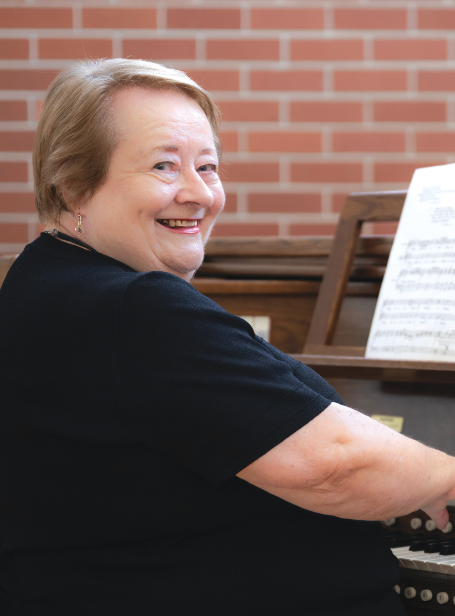
Long-term IEU member Bronwyn Brown, awarded an OAM for services to the community through music. Photo: Alan Lee
Bronwyn Brown is proud to be a role model showing students they can combine a career in maths and science with a passion for music.
Awarded a Medal of the Order of Australia (OAM) in the 2024 Australia Day Honours list for services to the community through music, Brown said her first job at school was in Year 5 when she was asked to accompany the class while they were singing.
She had started learning piano at age five, even though her passion was for the organ.
“Mum said I was too small for the organ, but eventually I got to play it,” Brown said.
While studying for her science degree, she played the organ at weddings to pay her way through university. Her first ‘proper job’ was at Fairfield High School as a science teacher.
“This was probably the only school where I didn’t play the piano,” she said.
Starting at Roseville College Sydney in 1978 as a science teacher, Brown became Head of Mathematics for the final five of her 17 years there.
“People find out you can play and next thing you’re accompanying the national anthem, the choir, assemblies, musicals, chapel,” she said.
Brown then moved to Brisbane where she continued to combine maths and music, also becoming Head of Mathematics at St Aidan’s Anglican Girls’ School in Brisbane.
Her husband, Graeme, was working at Brisbane Boys’ College. For each of the last 10 years they were in Brisbane, he produced musicals for the students from both their schools, with Brown as rehearsal pianist.
“After a while, we decided Brisbane was too hot and we were looking for somewhere to retire. Canberra was supposed to be the retirement place, but it didn’t last long. We both got jobs at Radford College, me teaching maths, him teaching science.
“Then when we said we didn’t want to be in the classroom anymore, the principal, who was a pretty resourceful fellow, suggested we job share the role of music administrator for the college’s extensive co-curricular program.
“So, since then, I’ve mostly been involved with music and just a little bit of maths on the side.”
Now 76, Brown is still playing for choirs and school chapel services, and helping kids with recitals and exams.
Her honours listing refers to her work as official accompanist for the Eisteddfods in Sydney and Canberra, a rehearsal pianist for Australian Opera principals, an accompanist for Sydney Male Choir and Willoughby Choral Society, Brisbane Concert Choir and Sing Australia.
She’s been an organist at Wesley Canberra Uniting Church, Christian Science Church in Canberra, Roseville Methodist/Uniting Church and St Andrew’s Uniting Church in Brisbane. “As long as the fingers still work, I’ll keep playing,” she said.
Brown believes there is something to the theory that people who are good at maths are also good at music.
“I think there’s a lot in it, for sure,” she said. “I think the symbols that are used in both appeal to people with certain sorts of brains that can handle that kind of thinking. Music has its own order, rules and structure which you can analyse, similar to problem solving in maths.”
“If in secondary school, kids can see you are able to be academic and also keep musical interests going, these ideas stick a long time.
“I think teachers have a huge influence, so opportunities that you get while you’re at school are absolutely vital.”
Brown’s son, a science teacher, is also a very good brass player, and uses his music for several co-curricular activities at his school.
Both Bronwyn and Graeme are long-time union members. Graeme was an IEU rep at New England Girls’ School in Armidale in regional NSW, and Brown first joined a union in the 1970s.
“When I was at university, I was influenced by the Vietnam demonstrations and took part in the teacher strikes at that time,” she said.
“Feminism was on the rise, and I became very angry at the establishment with the business about women in the public system not being given permanent positions if they got married. So, I developed this attitude that you never trust an employer.”



































































































































